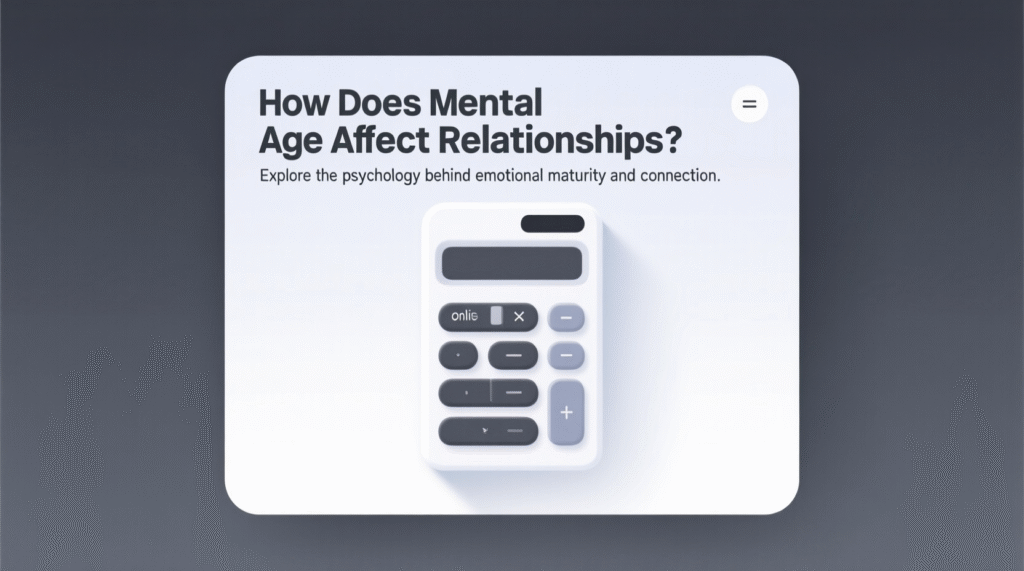
Your mental age—the level of emotional maturity and perspective you carry—can shape every part of your relationships. It influences how you communicate, handle conflict, build trust, and express love. Two people may share the same chronological age, but if their mental ages differ greatly, the relationship can feel unbalanced.
Mental age affects relationships by guiding communication, conflict resolution, emotional support, and commitment. A higher mental age often means calmer communication, better empathy, and long-term thinking, while a lower mental age may bring more playfulness, spontaneity, or instability.
How Does Mental Age Affect Relationships?
Communication Styles
How you talk—and listen—reflects your mental maturity.
- Higher mental age: Speaks clearly, respects boundaries, listens to understand.
- Lower mental age: May avoid tough conversations, overreact, or struggle with boundaries.
Example: In a disagreement, one partner calmly explains their feelings while the other avoids the topic altogether.
Conflict Resolution
Every couple faces disagreements. Mental age determines whether these become growth opportunities or recurring battles.
- Mature mindset: Approaches conflict as “us vs. the problem.”
- Immature mindset: Frames conflict as “me vs. you,” leading to blame or withdrawal.
Emotional Support
The ability to be there for your partner depends heavily on emotional maturity.
- High mental age: Offers empathy, reassurance, and consistency.
- Low mental age: May prioritize their own comfort, dismiss emotions, or rely heavily on the other for support.
Learn how IQ and maturity differ in is mental age the same as IQ.
Trust and Commitment
Trust grows when both partners think beyond the present moment.
- Higher mental age: Seeks stability, values promises, invests in long-term growth.
- Lower mental age: May enjoy excitement but struggle with consistency.
Balance in Relationships
A mismatch in mental age doesn’t mean the relationship is doomed—it simply means both partners may need to adapt.
- When both partners share a higher mental age, they often experience stability and deeper connection.
- When both share a lower mental age, the relationship may feel adventurous but lack grounding.
- A big gap in maturity can make one partner feel more like a caretaker than an equal.
Learn why your mental maturity matters as much as IQ in why is mental age important.
Quick Comparison Table
| Relationship Area | Higher Mental Age | Lower Mental Age |
|---|---|---|
| Communication | Calm, respectful, clear | Reactive, avoidant, impulsive |
| Conflict Resolution | Collaborative, problem-focused | Defensive, blame-shifting |
| Emotional Support | Empathetic, consistent | Self-focused, emotionally inconsistent |
| Trust & Commitment | Long-term stability, reliability | Present-focused, easily distracted |
How to Bridge Mental Age Gaps
- Set clear expectations about communication and priorities.
- Balance strengths: Let one bring structure, the other bring energy.
- Grow together: Read, learn, or attend therapy as a couple to raise shared maturity.
FAQs About Mental Age in Relationships
Is mental age more important than chronological age?
Yes. Compatibility in maturity often matters more than age numbers.
Can a mentally younger partner grow in maturity?
Absolutely. Reflection, therapy, and experience can raise mental age over time.
Does higher mental age always mean better relationships?
Not always. While maturity brings stability, a youthful mindset adds fun. Balance is key.
What if my partner’s mental age is very different from mine?
Open communication and mutual effort can help bridge the gap.
Final Thoughts
Mental age shapes how we love, fight, and support one another. A mature mindset builds deeper trust and stability, while a younger mindset adds energy and spontaneity. The healthiest relationships often combine both—maturity to stay grounded and playfulness to keep love alive.
- A deeper look is provided in can mental age impact relationships.
- How decisions influence connection is explained in mental age and decision making.
- Emotional development in relationships is covered in mental age vs emotional age.
- Behavior differences across maturity levels appear in how do you act according to your mental age.
- Why mental age matters for bonds is discussed in why is mental age important.
- Relationship growth patterns are explored in what affects your mental age.